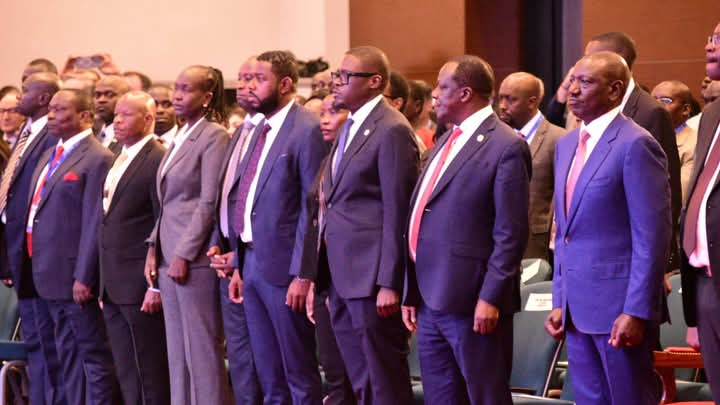
 A section of leaders led by president William Ruto during opening of the WCF Africa summit in Nairobi/COURTESY
A section of leaders led by president William Ruto during opening of the WCF Africa summit in Nairobi/COURTESY South Sudan took a significant step toward regional economic integration during the World Chambers Federation (WCF) Africa Summit 2025, held in Nairobi.
Trade and Industry national minister Atong Kuol Manyang who led the nation’s high-level delegation reaffirmed their commitment to joining and benefiting from the African Continental Free Trade Area (AfCFTA).
Speaking at the summit, Manyang emphasised the importance of AfCFTA ratification for South Sudan’s economic future.
"This summit underscores the urgency for South Sudan to integrate fully into continental trade frameworks," she stated.
"We must unlock opportunities for our entrepreneurs, facilitate cross-border trade and eliminate barriers that limit growth."
The summit, which drew over 4,500 delegates from over 70 countries, was officially opened by President William Ruto.
It was organised by the Kenya National Chamber of Commerce (KNCCI) in partnership with WCF.
The meeting offered South Sudanese officials and businesses a platform to forge new trade partnerships, attract investment and share in Africa’s innovation-driven growth.
The delegation engaged in policy dialogues, investment forums and AfCFTA masterclasses, gaining critical insights into sustainable development and digital transformation.
Manyang also highlighted the summit’s impact, noting this is not just a meeting but a launchpad for action.
"South Sudan is ready to harness innovation, empower youth and women and champion inclusive, green economic growth," she said.
The summit’s outcomes provide a roadmap for South Sudan to improve trade facilitation, reduce customs inefficiencies and amplify its voice in shaping regional trade policy.
By aligning with AfCFTA goals, South Sudan aims to emerge as a competitive player in Africa’s evolving trade landscape.
AfCFTA aims to create a single continental market for goods and services, facilitating trade and investment across the African continent.
Its primary objective is to deepen economic integration and achieve the Pan-African vision of a prosperous and peaceful Africa, as outlined in Agenda 2063.
The agreement encompasses trade in goods, services, investment, intellectual property rights, competition policy, digital trade, and more.
Its operational phase commenced on January 1, 2021.
The agreement entered into force on May 30, 2019, following the 22nd deposit of instruments of ratification.












